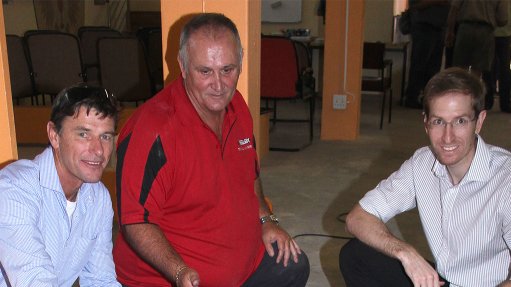
Company Announcement - Demand for a.b.e. Construction Chemicals’ abescreed SLC P fast-track self-levelling screed and abescreed SLC acrylic primer has soared since the products underwent three important reformulations recently. “The main reason for the latest reformulation in 2014 was to boost the ‘green’ qualities of the products by including the self-levelling screed and its primer in the range of dustless cementitious products now being produced at a.b.e.’s Boksburg plant as part of the Chryso Group’s sustainable development programme,” says a.b.e. National Sales Manager: Flooring, Peter Jones. “Prior to that, a.b.e. also changed the formulation of the self-leveller to increase its performance and also to make the production process as economical as possible to offer the best price to our customers.”
abescreed SLC P is a single-pack, rapid hardening cement-based screed for self-levelling floors, ideal for situations where quick setting is essential so that carpets, ceramic tiles, vinyl, wood block or cork need to be applied quickly.. The product can be used on new floors or for smoothing floors in office buildings, private homes, shops, public buildings, schools, hospitals, airports, prisons, factories, workshops and warehouses.
The success of abescreed SLC P and its primer has led to an exclusive large-scale supply agreement being concluded last year between a.b.e. and a leading South African flooring company, FloorworX. Jones says abescreed SLC P has many benefits. “To give just a few examples: it can be pumped or hand-laid; about 2000 square metres can be pumped per day; it can be walked on after only two to four hours; and it won’t harbour bacteria which is vital for premises such as hospital and clinic floors,” he explains.
In fact, abescreed SLC P has in the last few months been installed at several hospitals, including 2 Military and Karl Bremer hospitals in Cape Town, Vredenburg Hospital, De Aar Hospital, Polokwane Hospital, Newcastle Hospital and a major hospital in the Democratic Republic of the Congo.
abescreed SLC primer, which is applied prior to abescreed SLC P, improves the self-levelling screed’s adhesion to the concrete substrate, reduces surface absorbency, and seals the substrate.
Another popular a.b.e. flooring product is abecote WD 337, a two-component, solvent-free, water-dispersed epoxy emulsion that produces floor coatings with a paint smooth finish. abecote WD 337 floor coatings are robust enough to have been applied as protection for factory and warehouse floors throughout South Africa. Floors at chicken farms, dairies, motor workshops and even battery plants - with their acidic environment - are protected with abecote WD 337. a.b.e. says it is even strong enough to protect floors in “nuclear decontaminable areas”.
Other notable a.b.e. flooring products include:
• abecote 400 Hi-build: an epoxy floor coating that is seamless and hygienic that can be applied to a variety of surfaces – and as binder for abrasive grit to yield non-slip flooring;
• abeflo: a self-levelling compound for decorative, seamless, hard-wearing and chemical-resistant flooring;
• abescreed: mortar flooring system with seamless finishes without crevices for dirt and bacteria to gather;
• abescreed PU: a polyurethane mortar with exceptional chemical resistance, and the ability to resist heat of up to 120 degrees Celsius;
• abescreed SLC P: a pumpable fast-track self-levelling screed for refurbishment and new construction where carpets, ceramic tiles, vinyl, wood block or cork need to be applied quickly;
• abeco mastic: a cold-laid bituminous heavy-duty mastic flooring system which can be laid over any firm, clean sub-flooring such as concrete, steel and timber;
• abeflo HPU: a polyurethane self-levelling chemical resistance mortar;
• abeplate: an iron-armoured, dry-shake metallic-aggregate surface hardener; and
• abecron: a dry-shake mineral-aggregate surface hardener which provides up to twice the service life of a plain concrete floor.